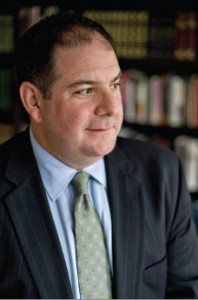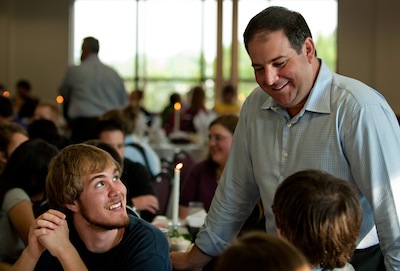 [dropcap3]A[/dropcap3] few months ago, I spoke at a church that has had very little contact with PBU in the past. After I finished my address, I entered a conversation with a gentleman who wanted to know more about us. He wanted to know what we meant by calling ourselves a biblical university and what was so unique about that. I told him that PBU is a university intentionally centered upon the Lord Jesus Christ and His Word. I shared with him that often people do not realize that we have diverse and rigorous undergraduate and graduate academic programs and a flourishing, dynamic campus life. He understood, and expected these things to be so, based upon the word university in our name. I went on to talk about the personal investment of our faculty in the lives of students and a PBU education that emphasizes biblical integration and the cultivation of wisdom. Again, he was not surprised, though he was encouraged to hear that a Christian university was institutionally committed to these things. Finally, I outlined that as part of educating students to serve Christ in the church, society, and the world, we sought strategic engagement with the world in which we live. This did surprise him. In fact, it was what was behind his original inquiry because I had announced our Annual Worldview Conference and the topic for this year. He wanted to know more about PBU in this regard. And I suppose he is not alone.
[dropcap3]A[/dropcap3] few months ago, I spoke at a church that has had very little contact with PBU in the past. After I finished my address, I entered a conversation with a gentleman who wanted to know more about us. He wanted to know what we meant by calling ourselves a biblical university and what was so unique about that. I told him that PBU is a university intentionally centered upon the Lord Jesus Christ and His Word. I shared with him that often people do not realize that we have diverse and rigorous undergraduate and graduate academic programs and a flourishing, dynamic campus life. He understood, and expected these things to be so, based upon the word university in our name. I went on to talk about the personal investment of our faculty in the lives of students and a PBU education that emphasizes biblical integration and the cultivation of wisdom. Again, he was not surprised, though he was encouraged to hear that a Christian university was institutionally committed to these things. Finally, I outlined that as part of educating students to serve Christ in the church, society, and the world, we sought strategic engagement with the world in which we live. This did surprise him. In fact, it was what was behind his original inquiry because I had announced our Annual Worldview Conference and the topic for this year. He wanted to know more about PBU in this regard. And I suppose he is not alone.
This year, we conducted our second annual worldview conference, a strategically significant event intended to facilitate learning and conversation around issues at the intersection of Christianity and culture. It is not a conference by academics, for academics. It is a conference for Christians who want to better understand the issues of the day and what a biblical perspective can and should bring to bear upon them. Last year, the conference addressed the issue of art, beauty, and the church. This year’s conference dealt with the timely issue of technology and the church. The presenters addressed relevant and thoughtful subjects and challenged attendees to be thinking about the implications of their technology choices in light of their biblical commitments and understanding. We spoke to issues related to usage of our time, innovation’s impact upon social expectations and roles, our enjoyment of creation, and challenges and opportunities of technology usage in ministry. This is something we should be doing as a Christian institution of higher learning, especially as one with our conviction that the Bible speaks to all areas of life and service.
As a biblical university, PBU is committed to engaging the culture and helping Christians think rightly about their place in the church, society, and the world. Christians should know the importance of being salt and light. They should know that while they are not of this world they are placed in it by a sovereign God. They should know the Bible teaches that all things are given by God for our pleasure. They should also know that while all things are lawful, not all things are profitable. The dilemma for the Christian is to resolve the tension between cultural engagement and godly thinking and living. What is their relationship to the world and the things of it? This requires of Christians a cultural wisdom, right thinking about culture, the things of culture, and their relationship to them, like technology. The conference is a new endeavor for PBU. And while we know that strategic engagement with the world requires more of us than hosting conferences, it is partly accomplished by offering such conferences as a means to providing guidance to Christians regarding their own thinking and living in this world.
The Christian life is real life, in real time, and real space. Our faith is not a virtual one. It is an incarnational one.
The Christian life is real life, in real time and real space. Our faith is not a virtual one. It is an incarnational one. God made all things, all creatures, in physical form. He called his people out of one culture and gave them a land where they shaped another. He revealed Himself to humanity through His Son and saved humanity by His Son’s atoning sacrifice — through His death, and bodily resurrection. He has given us life, spiritual life and physical life, to enjoy to His glory. We enjoy relationships, nature, food, the arts, sports, and even technology. But we are also to bring a biblical faith and worldview to bear upon how we think about and experience these things. We need to enjoy and engage the culture around us and not hide from it, but we must be wise about it, and be thinking about the implications of our choices regarding all things cultural. God’s people are to be set apart, yet actively engaged. This is no thoughtless task. PBU desires to cultivate in its students the ability and inclination to exercise such wisdom, that they may truly be in the world without being of it. And part of what we must do is provide opportunities to practice this.
 When I reflect upon the many conversations I have had about PBU’s work of engagement I am reminded that our approach is, and must be, broad and comprehensive. It must involve thinking, studying, reflecting, and doing. Our intention is that students in every program, at every level, would have the opportunity to wrestle with the issues of the day and the implications of biblical truth for thinking and living in this world, and to work out what they are learning in real time with real people. Service projects, ministry involvement, practicums, placements, internships, athletics, the arts, student leadership, conferences, chapels, and classes all converge to create an experience which we pray will instill in our students an aspiration to participate and engage as responsible and caring citizens; professionals; and, most importantly, Christian men and women of character. But as an institution we do more than simply teach this, we have the obligation to model it. This is what a biblical university does. It leads, guides, engages.
When I reflect upon the many conversations I have had about PBU’s work of engagement I am reminded that our approach is, and must be, broad and comprehensive. It must involve thinking, studying, reflecting, and doing. Our intention is that students in every program, at every level, would have the opportunity to wrestle with the issues of the day and the implications of biblical truth for thinking and living in this world, and to work out what they are learning in real time with real people. Service projects, ministry involvement, practicums, placements, internships, athletics, the arts, student leadership, conferences, chapels, and classes all converge to create an experience which we pray will instill in our students an aspiration to participate and engage as responsible and caring citizens; professionals; and, most importantly, Christian men and women of character. But as an institution we do more than simply teach this, we have the obligation to model it. This is what a biblical university does. It leads, guides, engages.
[framed_box]Todd J. Williams, Ph.D. has been the President of Philadelphia Biblical University since January 2008. He served as faculty and an administrator from 1996 to 2001, and then returned as Provost in 2005. Interact with Dr. Williams on his PBU blog.
[/framed_box]